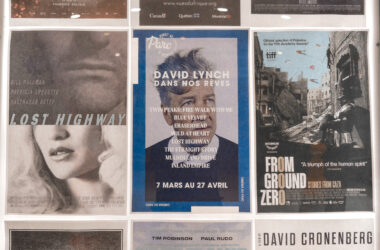“In the beginning, there was lust,” and in the end, there was still lust. Alexandre Marine’s latest stage production, L’evangile selon Salome, is a harrowing tale of a struggling youth, Salome, trying to resolve internal and external conflicts. The classic tale follows a series of modern theatrical twists, boasting musically inspired moments complemented by a world of incestuous perversion, deception and homoeroticism.
Viewed through the eyes of 13-year-old Salome (Marie-Eve Beaulieu), the play is a retelling of John the Baptist’s beheading. It begins with a brief introduction of characters and history that serves as a prelude for a misanthropic clash between mother Heroditias (Monia Chokri) and her daughter, Salome, over John’s affection. Although the play shoots off in many directions, it is centered on a dysfunctional family where – through their sexual wiles – women, rather than men, command power.
The piece weaves through a series of subplots involving uncle-stepfather Antipat’s pedophiliac obsession with Salome, father Phillipe’s never-ending confusion and Salome’s first sexual experience. The conclusion of the play, while abrupt, is in line with the notions that characterize the text and performances. It provides resolution for undeservingly nasty male characters, yet does not assign any redeeming qualities to female protagonists.
Marine’s spot-on casting and sprinkled irony provide brief comedic pauses in the rather intense narrative, allowing viewers to enjoy the complex sous-entendus that would otherwise be lost in passing.
Monia Chokri gives a wonderfully sensual performance as Heroditias, while Marie-Eve Beaulieau’s Salome is a mesmerizing portrait of innocence. Phillipe Cyr’s interpretation of John is in line with classic elegiac figures and presents nothing innovative in terms of theatrical expression, whereas Vitali Makarov’s (Antipas) fulfillment of a particularly deranged character yields a more liberal interpretation.
Various symbols in the play are employed to reinforce plot and character identity. The most notable include money, balls and a table. “The balls are supposed to represent innocence and at the same time are pieces of a phallic symbol” says Marine.
In a brief post-performance interview, Marine explains that the crux of the work is “its focus on the development of youth and how it relates to current adolescents. It’s about female mendacity, sex as platform for power and the reconciliation of one’s desires.” He adds that as an artist, “it is for the audience to take away what they want from the play and not for me to tell them.”
This play gets a favourable review, though with a few disclaimers. Some audience members might be shocked at the sight of partial or complete nudity, and all who attend should be able to understand quickly spoken French. A working knowledge of contemporary theatric productions as well as an overview of Salome’s historic importance would also be helpful; otherwise the piece may appear somewhat strange or even a bit offensive. But for those who enjoy boobs, balls and twisted family relations: two thumbs up!
Catch L’evangeline selon Salome at Theatre Prospero (1371 Ontario E) until Sept. 23. Call (514) 526-6582 for reservations. Showings are at 8 p.m.








